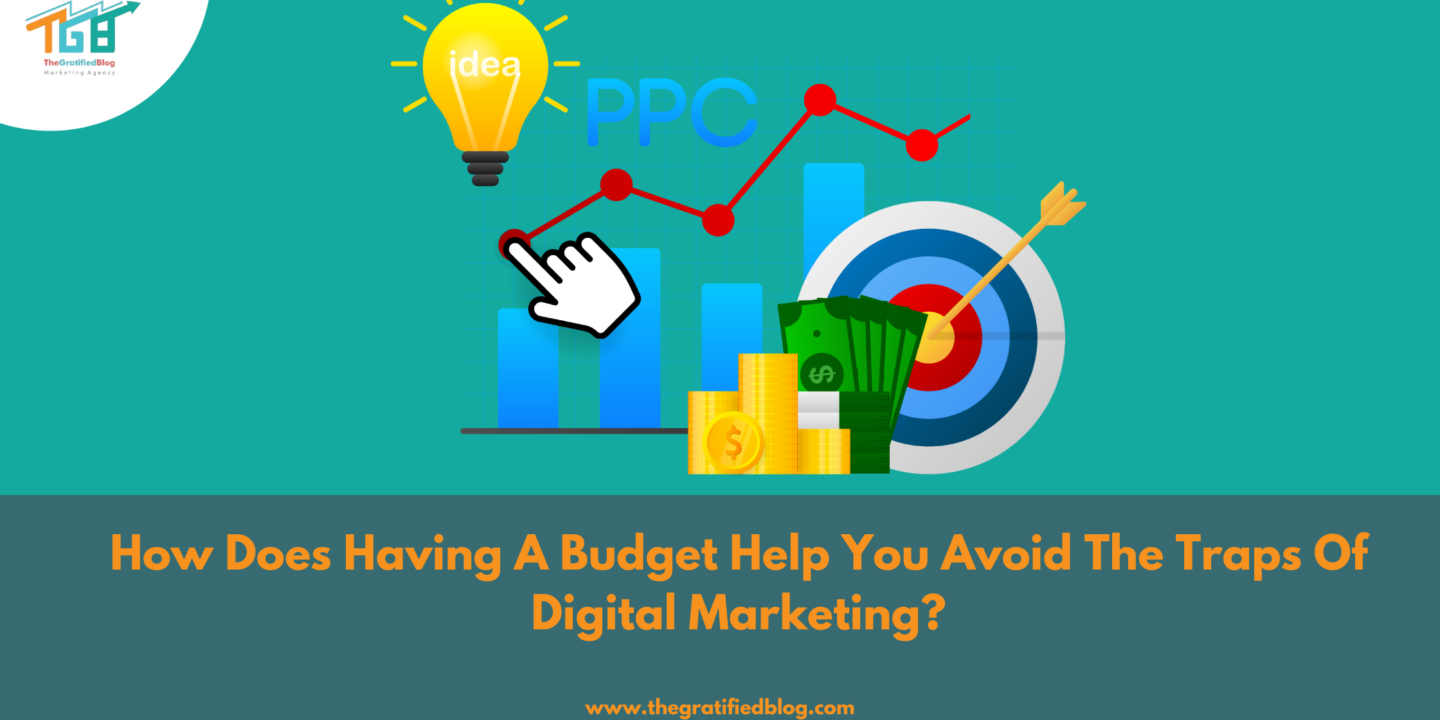
Success in today’s fast-paced and ever-evolving business landscape relies on the foundation of digital marketing. Companies worldwide are leveraging online platforms to connect with their target audiences, build brand recognition, and drive sales. However, within the allure of the digital realm lies a complex web of challenges and pitfalls that can ensnare even the most well-intentioned marketers. Navigating these potential traps requires a strategic approach, and one of the most effective tools in a marketer’s arsenal is a well-structured budget. How does having a budget help you avoid the traps of digital marketing?
In this article, we will explore the topic of budgeting within digital marketing. We’ll investigate How Having A Budget Help You Avoid The Traps Of Digital Marketing? Furthermore, we’ll outline the step-by-step process for crafting a digital marketing budget and introduce various tools and resources to aid in this budgeting endeavor.
So, let’s get started;
Concept Of Budgeting In Digital Marketing
At its core, digital marketing budgeting involves strategically allocating financial resources to various online marketing activities and campaigns. Just as a financial budget helps individuals manage their spending, a digital marketing budget limits how much a company is willing to invest in its online marketing efforts. This budget acts as a financial roadmap, guiding decision-makers on where and how to allocate funds for maximum impact. It’s a proactive measure that ensures that marketing activities remain within predefined financial boundaries, preventing reckless spending and promoting fiscal responsibility.
Digital marketing budgets encompass a range of expenses, including paid advertising, social media promotion, content creation, search engine optimization (SEO), and more. The budget isn’t a static figure; it’s a dynamic tool that needs regular evaluation and adjustment to reflect changes in business goals, market conditions, and the effectiveness of ongoing campaigns. Effective budgeting requires a clear understanding of the company’s objectives, target audience, and the potential return on investment (ROI) from various marketing channels. By comprehensively planning and controlling expenditures, businesses can streamline their resources and reduce the risk of overspending on ineffective strategies.
Now, let’s delve more profoundly into how the presence of a budget serves as a shield against the pitfalls of digital marketing.
How Does Having A Budget Help You Avoid The Traps Of Digital Marketing?

Preventing Overspending On Ineffective Campaigns
Without a budget, businesses might fall into the trap of continuously investing in campaigns that aren’t generating substantial rates, and having a budget forces marketers to assess the performance of each campaign regularly.
For instance, a company might allocate a budget to a Facebook ad campaign. If, after a certain period, the campaign isn’t driving the desired engagement or conversions, the budget limitation prompts a reevaluation, leading to a decision to reallocate resources to more promising strategies.
Enforcing Targeted Audience Reach
Digital marketing allows for highly targeted audience reach, but without budget constraints, businesses opt for broader audiences that could dilute the impact of their message. With a budget in place, marketers are incentivized to focus on the most relevant segments.
For example, an e-commerce retailer aiming to promote its luxury watch collection might set a budget to target individuals with higher disposable incomes rather than spending resources on a general audience.
Adapting To Algorithm Changes And Trends
Algorithms governing platforms like search engines and social media are subject to frequent changes. A budget provides the flexibility needed to adapt strategies when these changes occur.
For instance, a sudden shift in the Instagram algorithm might necessitate changing a company’s influencer marketing strategy. The business can make these adjustments with a budget without overshooting their financial limits.
Tracking And Measuring ROI
An adequate budget facilitates accurate tracking of expenditures and, consequently, the measurement of return on investment. Businesses can assess which campaigns are delivering the desired outcomes.
For instance, a software startup allocating a budget to Google Ads can gauge the number of clicks and subsequent sign-ups. This allows them to calculate the cost per acquisition and determine the campaign’s overall effectiveness.
Averting Resource Drain
Digital marketing encompasses various channels, from social media to content creation. With a budget, businesses might allocate resources appropriately, leading to a drain on their time, personnel, and creative assets. With a budget, a company can allocate specific amounts to different channels based on their strategic importance. This ensures that resources are distributed intelligently, preventing resource overallocation or underutilization.
Setting Clear Goals And Constraints
A budget mandates that businesses set clear goals and establish constraints, which is crucial for effective decision-making.
For instance, a travel agency setting a budget for their online advertising might define a goal of increasing bookings by 20% and allocate resources accordingly. The budget is a benchmark against which they can measure their progress, allowing them to make informed adjustments if needed.
Transitioning from understanding the benefits of having a budget in digital marketing, let’s delve into the concrete steps of crafting a well-structured digital marketing budget. This section will outline the practical actions you can take to develop a budget that aligns with your goals and maximizes your marketing resources.
Practical Steps For Creating A Digital Marketing Budget
Developing an adequate digital marketing budget Requires a strategic approach that aligns with the objectives of your business and maximizes your resources.
Here are the essential steps to guide you through the process:
Analyzing Past Campaign Performance
Before creating a new budget, assess the outcomes of your previous digital marketing campaigns. Review metrics such as conversion rates, click-through rates, and engagement levels. This analysis provides insights into which strategies have been successful and which need improvement.
By understanding what has worked in the past, you can allocate resources more efficiently and avoid repeating ineffective approaches.
Setting Clear Goals And Objectives
Define specific and measurable goals for your digital marketing efforts. Whether it’s increasing website traffic, boosting sales, or expanding your social media following, having clear objectives helps you allocate your budget toward achieving these outcomes.
Each goal should be realistic and aligned with your broader business objectives. For example, if you aim to accomplish a 15% increase online sales during the upcoming quarter, your budget can be structured around attaining that target.
Allocating Funds Based On Priority And Potential ROI
Determine the various digital marketing channels and strategies that align with your goals. Allocate funds based on their priority and potential return on investment. Some channels may yield higher conversion rates, and specific techniques have proven more cost-effective.
For example, if you’ve found that email marketing consistently generates strong ROI, allocating a significant portion of your budget to this channel is prudent.
Monitoring And Adjusting The Budget As Needed
A digital marketing budget isn’t set in stone. Consistently oversee the performance of your campaigns and track spending against your budget allocations. Utilize analytics tools to collect data on essential performance metrics indicators (KPIs) such as engagement, conversions, and click-through rates.
If particular strategies outperform expectations, consider reallocating additional funds to capitalize on their success. Conversely, if a campaign needs to deliver the expected results, be prepared to adjust the budget allocation accordingly.
Incorporating Flexibility For Emerging Opportunities
While planning your budget, flexibility to seize unexpected opportunities or address emerging trends. The digital landscape evolves rapidly, and new platforms or strategies that could benefit your business might arise. A portion of your budget dedicated to experimentation or adapting to unforeseen changes can help you stay agile and competitive.
Documenting And Communicating The Budget
Once your budget is finalized, document it comprehensively. Clearly outline the allocated funds for each strategy, channel, and campaign. This documentation ensures transparency within your marketing team and allows for effective communication with stakeholders. Regularly review the budget’s progress and outcomes. Collaborate with your team to ensure everyone is aligned and informed.
Having gained insights into the practical procedures for formulating a digital marketing budget, let’s now explore the tools and resources available to assist you in effectively managing your budgeting endeavors within the digital marketing realm.
Tools And Resources For Budgeting In Digital Marketing
Budgeting in digital marketing can be significantly facilitated by many tools and platforms designed to streamline the process and enhance decision-making.
Here are various tools that can aid you in creating, managing, and optimizing your digital marketing budget:
- Google Ads Budget Planner: Google Ads provides a Budget Planner tool that assists in estimating your campaigns’ potential reach and results based on different budget allocations. It helps you understand how changes in your budget can impact the performance of your paid advertising campaigns on the Google network.
- Analytics Tools (Google Analytics): Analytics tools provide invaluable insights into the effectiveness of your campaigns. They help you track metrics such as traffic, conversions, and engagement, allowing you to analyze the ROI of different marketing channels and campaigns. These insights inform budget allocation decisions.
- Budgeting Spreadsheets (Excel, Google Sheets): Simple yet effective spreadsheet software allows you to create customized budget templates. You can track expenses, allocate funds to different campaigns, and compare actual spending against your planned budget. This strategy is particularly advantageous for small businesses or those with limited resources.
- Project Management Tools (Asana, Trello): While not explicitly designed for budgeting, project management tools can assist in tracking marketing campaigns, tasks, and associated expenses. They help ensure that you stay within budget by providing visibility into the financial aspects of your projects.
Incorporating these tools and resources into your budgeting process can significantly enhance your ability to allocate resources effectively, monitor performance, and make informed decisions that drive positive outcomes for your digital marketing campaigns.
Conclusion
Are you armed with a comprehensive understanding of how having a budget help helps you avoid the traps of digital marketing? Why continue to expend resources on superfluous campaigns? Take action today and witness firsthand how implementing a strategic budget can lead to substantial savings for your endeavors.
If you still have any questions regarding the topic, please leave them in the comments section. Feel free to inquire, and we’ll gladly respond to your questions.
Thanks for reading








No Comments